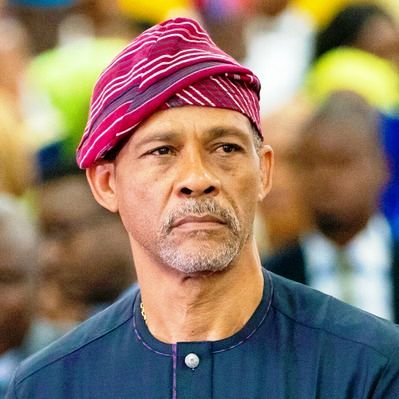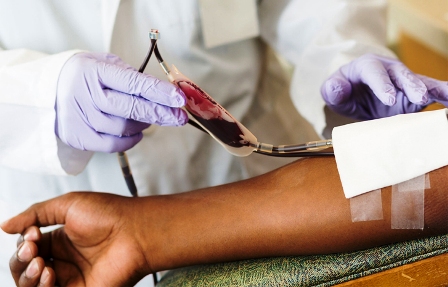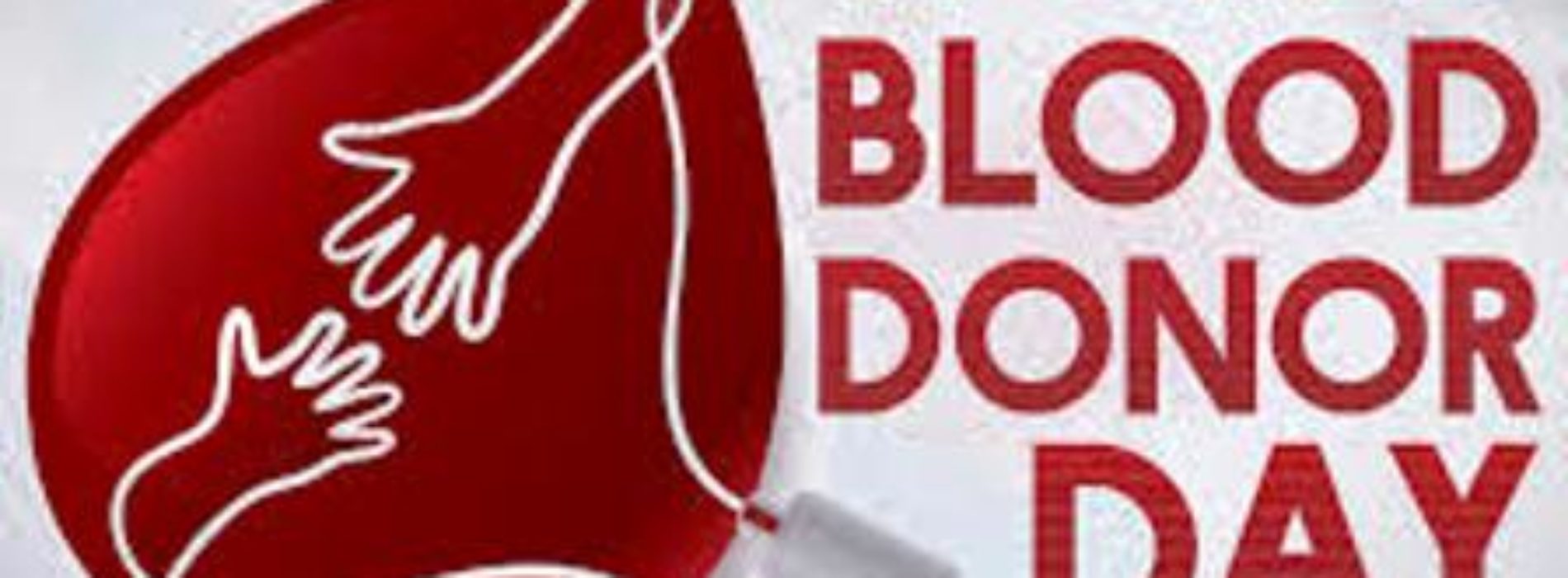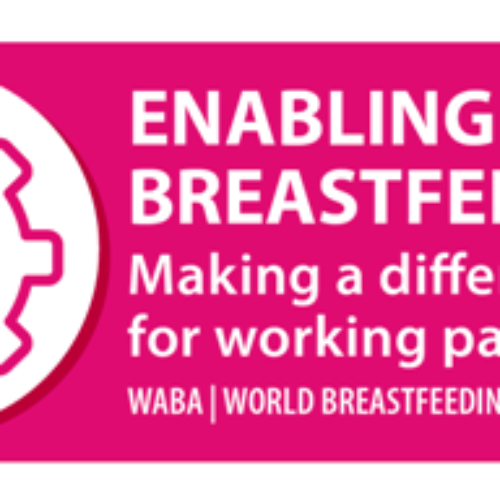Nigeria yet to meet up to 10% of blood need, says Haematologist on World Blood donor Day
-
Transfusion service to convert commercial blood donors to voluntary
-
Lagos requires 260,000 units annually
A Consultant Haematologist at the Federal Ministry of Health, Dr Uche Nwokwu says Nigeria is yet to meet up to 10 per cent of its blood need in the country.
Nwokwu made the call in an interview with News Agency of Nigeria (NAN) in Abuja to commemorate the World Blood Donor Day (WBDD)
WBDD is celebrated every June 14, to raise awareness of the need for safe blood and blood products and to thank blood donors for their life-saving gifts of blood.
“We are still far from what is needed but unfortunately, in a country of over 200 million and we are not yet met up to 10 per cent of our blood need as a country.
“So many people die because of blood loses, in our country where they are security challenges, where they are killings and trauma, crises in various communities, road traffic accidents, various diseases condition and people are going for various surgeries.
“The blood need of the country is quite huge and we are very far from meeting that need, so Nigerians are encouraged to willing go to any blood donation centres around.
“Federal Government has established the National blood Transfusion Service, and that has zonal offices across the country.
“They can voluntary go to those centres and donate, and when they are donor drive activities in their neighbourhood, they are encouraged to donate as they donate, life is saved.’’
The World Health Organisation (WHO) stipulates that at least one per cent of the population must be able or willing to donate blood.
Nigeria needs between two to four million units of blood annually with the population of 200 million going by the indicators that the WHO had provided to be able to meet the transfusion requirement of Nigerians.
Nwokwu said there is still blood supply deficiency in the country despite the efforts of the Federal Government and Civil Society Organisations on awareness creation.
He attributed the blood supply deficiency to some myths surrounding blood donation.
“I mean, the awareness and response is still far from expected because of the myth surrounding blood donation so there is still phobia for donating blood.
“They are afraid of the consequences of fainting, of losing blood themselves and that has affected blood donation.
“They are also traditional belief on blood that has affected the response of Nigerians to donate blood.’’
The consultant, urged Nigerians to dismiss the myths surrounding blood donation and donate blood regularly.
“They are benefits of donating blood; Apart from the moral satisfaction of saving lives, if you donate blood within two weeks, your system has a way of replacing the blood you have donated.
“It essentially makes one healthier if you donate and it is advisable to donate blood quarterly, once in three or four months is allowed. It makes the person healthier.
“Personally, I donate twice every year -January and July. I have been doing that and I have not had cause to need blood myself and have not to fall sick. In fact, I can’t remember the last time I took drug for malaria. I do it as sacrifice and God has been using it to strengthen me.’’
Lagos Requires 260,000 Units

Prof. Abayomi
Lagos State Commissioner for Health, Prof Akin Abayomi has disclosed that the State will require not less than 260,000 units of blood annually to meet with the growing blood transfusion demand at health facilities in the State.
Abayomi who disclosed this today through a Zoom Live Feeds organized by the Lagos State Blood Transfusion Service (LSBTS) to commemorate this year’s World Blood Donor Day in Lagos noted that efforts are being intensified by the State government to meet and surpass this requirement through recruiting and retaining voluntary blood donors.
“To maintain an adequate blood supply, one to two percent of the population needs to become regular blood donors; this is about 260,000 in a growing population of over 26 million in Lagos state. The regular supply of blood is essential as the life span of blood is very short. Each unit of blood donated remains viable for 35days. Thankfully, we are working hard in partnership with the public and private sector, Non-governmental organizations, religious bodies, youth organizations to achieve this target number”, he said.
Speaking on the theme of the year 2020 World Blood Donor Day; ‘Safe Blood, Saves Lives with The Slogan “Give Blood And Make The World A Healthier Place’, the Commissioner said that encouraging and promoting voluntary blood donation in a safe and conducive environment is the goal of the State government.
“This year’s theme has come in at a time the ongoing COVID-19 pandemic and the various phases of lock down and travel restrictions have brought about some challenges to our blood donation drives. The need for blood transfusions and medications based on blood components has however continued despite the COVID-19 pandemic, the LSBTS voluntary blood donation centers were open all through with an extension in our opening hours”.
“Scientifically, there are no confirmed reports of coronavirus being transmitted by blood transfusion anywhere in the world and strict additional safety measures including more hand washing sites, use of hand sanitisers, use of personal protective equipment as well as maintaining social distancing is kept are being practised at the blood collection sites for donors and staff”, Abayomi said.
He explained that making the world a better place is not only about blood collection from donors or its transfusion, but the collection of convalescent plasma from those that have recovered from COVID-19 infections in preparation for an interventional study in the treatment of patients with severe COVID-19 infection.
While noting that there is no substitute for blood, the Commissioner noted that the lives of hundreds of patients including pregnant women, children with severe anemia, accident victims, patients with cancer and haemoglobinothies are saved by Blood transfusion stressing that adequate and timely supply of safe blood is needed to continue helping those people who are in need of blood transfusion.
“We therefore cannot over emphasized the need to ensure availability of blood in our blood banks where patients who require blood transfusion can be readily supplied. While I would like to say a big thank you to all voluntary blood donors who have made it a duty to give the gift of life – blood, I would also like to use this medium to encourage citizens who are healthy and fit and aged from 18-65 to please give blood. People in good health who have never given blood, particularly young people, should begin to do so”, Abayomi said.
Speaking in the same vein, the Executive Secretary, LSBTS, Dr. Bodunrin Oshikomaiya said the campaign to increase voluntary blood donation drive has been intensified and sustained to meet with the blood transfusion needs in Lagos State.
She noted that LSBTS is working with the World Health Organization to improve access to blood transfusions and promote blood safety, focusing four key areas which includes; centrally coordinated blood transfusion service, collection of blood exclusively from voluntary donors from low-risk populations, testing of all blood for compatibility and transfusion-transmissible infections, and reduction of unnecessary transfusions.
“Blood safety involves all activities related to blood collection from low-risk, regular, voluntary unpaid donors as well as testing, processing, storage and distribution of blood. The LSBTS, governed by the national blood policy and the Lagos State legislation, promotes uniform implementation of standards and consistency in the quality and safety of blood and blood products”, Oshikomaiya said.
She added that health workers involved in blood transfusion have been trained on documentation, quality assessment and on the rational use of blood and blood products to reduce unnecessary transfusions.
“Over the years, training of staff on documentation, quality assessment and rational use of blood and blood products to reduce unnecessary transfusions, to minimize the risks associated with transfusion, to encourage the use of alternatives to transfusion where possible, as well as trainings on safe and good clinical transfusion practices have gone on in the state health facilities”, the Executive Secretary said.
Expressing delight that many citizens are responding positively to the clarion call to donate blood voluntarily, Oshikomaiya noted that the increase in voluntary blood donors is testament that citizens now recognizes the importance of blood donation and transfusion in saving lives.
Transfusion service

KINGSLEY Odiabara, Director, National Laboratory Manager, National Blood Transfusion Service (NBTS), says the
office is strengthening the relationship with hospitals to covert commercial blood donors to voluntary ones through
counselling.
Odiabara told the News Agency of Nigeria (NAN) on Monday in Abuja that NBTS was targeting to increase the pool
of voluntary donors in the next three years to achieve blood safety.
“We are also working to strengthen our partnership with hospital facilities. We are aware that many people go to the
hospital to donate as commercial and family replacement donors.
“If we strengthen the relationship with the hospitals, we will convert the commercial blood donors through
counselling into voluntary ones,’’ he said.
According to him, Nigerians response to blood donation has been commendable as many do so willingly.
“They walk into our centre to donate blood when they are due but the number of donors is insufficiently low compare
to what it should be.
“Ideally, we should be able to convert all commercial and family replacement donors to become voluntary donors.
“Until we get to that level where we have 100 per cent blood donation all coming from voluntary donors, we can’t
bite our chest and say we have achieved blood safety,” the NBTS director said.
Odiabara further said that NBTS was moving into the next level of component production and plasma
fragmentation.
“Plasma fragmentation is very key; if we are talking about the appropriate clinical use of blood, we must talk about
the right component to meet patient need.
“We are scaling up advocacy and sensitisation and awareness to increase the pool of blood donors to achieve blood
safety.
“We are hoping that in the next three years, even though we may not be able to achieve the World Health
Organisation (WHO) set standard, we should be able to record tremendous increase,’’ he said.
He noted that WHO stipulated that at least one per cent of the population must be able to donate blood regularly to
meet up with blood need of a country.
He said that Nigeria was yet to meet its blood requirement, saying“ we are yet to meet 10 per cent of our blood need.
“We have not been able to meet the national requirement based on the WHO standard, we have not been able to
meet the local need for blood and its products.
“We need to scale up and we are working at scaling up; we need to engage awareness on blood donation,” he said.
The director, however, thanked regular blood donors, especially the youths and urged them to donate more blood to
save lives.
“We are particularly grateful to Nathan John, the highest blood donor in the country; he has donates 63 times and
has been consistency, never defaulted whenever due.
“A man is requested to donate four times in a year except in case of illness or he falls short of the requirement. He
has been donating for the past 15 years,’’ he said.
NBTS is a programme of the Department of Hospital Services in the Ministry of Health, charged with the
responsibility of providing safe and quality blood for the nation.
Additional reports by NAN
About author
You might also like
FG scales up exclusive breastfeeding advocacies to promote nutrition
The Federal Government has scaled up advocacies to increase exclusive breastfeeding practices to promote nutrition for children and mothers. Mr Uruakpa John, Director, Micro Nutrients Deficiency Control (MNDC), Federal Ministry
GLOBALHealthPR Partners F/NE, South Africa’s Leading Independent Health Communications Consultancy
JOHANNESBURG, SOUTH AFRICA – GLOBALHealthPR, the largest independent health and science communications agency partnership worldwide, has announced its partnership with Johannesburg-based Consultancy firm, F/NE to its rapidly expanding global network.
Tanzania gets ‘nuclear’ cardiology kit
Tanzania has joined Kenya in setting up nuclear cardiology services for diagnosing and treating complications related to heart conditions. Last week, the Ocean Road Cancer Institute (ORCI) in Dar es





0 Comments
No Comments Yet!
You can be first to comment this post!